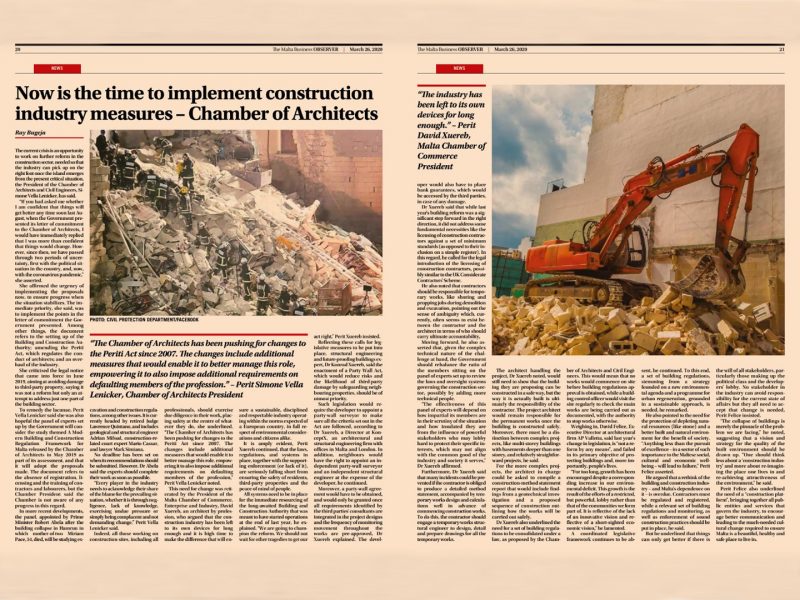
AP’s Executive Director David Felice was interviewed by Ray Bugeja of the Business Observer for its issue of 26th March 2020, in an article entitled ‘Now is the time to implement construction Industry measures’, David spoke about how for too long, growth has been encouraged despite a corresponding increase in our
Has the building reform failed?
The change in legislation – not a reform by any means – failed in its primary objective, that of protecting buildings and, more importantly,
Is there need to start from scratch?
The measures taken last year were a reaction to a problem that had been long evolving. Reform in the construction industry is overdue but will need to be tackled from a rounded perspective. For too long, growth has been encouraged despite a corresponding increase in our environmental deficit. This growth is the result of the efforts of a restricted, but powerful, lobby rather than that of the communities we form part of. It is reflective of the lack of an innovative and short-sighted economic vision. We thrive on the absence of a co-ordinated legislative framework. We urgently need a set of building regulations that stem from a strategy founded on a new environmental agenda and a programme for urban regeneration, grounded in a sustainable approach. There is also the need for a contemporary infrastructure, the protection of depleting natural resources (like stone) and a better built and natural environment for the benefit of all our society. Anything less than the pursuit of excellence – in a sector of such importance to the Maltese social, cultural and economic well-being -
Is the panel of experts set up by the government to assess the situation and make its recommendations enough to take the bull by the horns?
The panel is made up of competent individuals who are experts in their field. Its terms of reference are to review legislation governing the construction sector, especially during the initial stages of the execution of building works. This is both vital and urgent, but only part of the problem.
What are the top priorities all stakeholders must focus on?
It is time – indeed it has been for a long time now – to rethink the building and construction industry and our dependence on it. The first step must be the regulation and registration of contractors. This must be followed by the enaction of a relevant set of building regulations and monitoring and enforcement of sound construction practices. The overall intent will be to reverse the environmental deficit that we have
Are you confident things will get better any time soon?
Things can get better in a very short time if there is the will from all stakeholders, but especially that of our political class and of the developers’ lobby, to understand that change is necessary. If this does not happen, then no, I have no confidence that
Fingers are often pointed at the architect/s in charge. Is that fair?
It is, if the architect is to blame. But the profession is regulated, and legislation in this regard has a long history of practice and application. It is constantly being challenged and updated. Above all, it is overseen by a serious and competent professional organisation that does a lot of quiet work particularly in the area of monitoring the professional conduct of warranted architects. No stakeholder in the industry can avoid responsibility for the current state of affairs. But all need to accept that
Like accidents, will building collapses continue to happen, come what may?
The collapse of buildings is merely the pinnacle of the problem we are facing. Certainly the most serious, but not the only area of risk and danger to the public and the safety of construction workers. One needs to be reminded that there have been other deaths in recent months – mostly of non-Maltese construction workers – that were not the result of the collapse of buildings. While a fresh start based on a new approach will reduce risk, it also needs to address the response to accidents on site and the enforcement of
How would you go about the matter? What would your plan of action consist of?
Firstly, to develop a vision and strategy for the quality of our built environment – we need to be thinking less about a ‘construction industry’ and more about re-imagining the place we live in and re-achieving attractiveness
Secondly, we need to involve all stakeholders to create a legislative framework that addresses the regulation of all the players involved and enact building regulations based on sound research and the
Finally, we need to create a ‘construction platform’ that brings together all public entities and services that govern the industry, to work in a co-ordinated manner and to enable the provision of a fair, efficient and consistent service to stakeholders and the public, that will provide a network for the improvement and management of our built and unbuilt environment. This new ‘connectivity’ will be tasked with bringing about the much-needed cultural change required to ensure Malta is a beautiful, healthy and